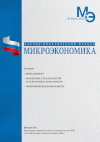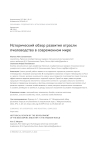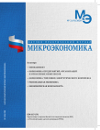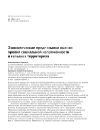Historical review of the development of the beekeeping industry in the modern world
DOI: 10.33917/mic-6.107.2022.60-65
The purpose of this work is to study the development of the beekeeping industry in the modern world. The study touched upon the history of beekeeping in Russia and in other countries, indicated the uniqueness of honey and other bee products, and also noted the effectiveness of conducting activities in this industry. One of the tasks of developing the market for beekeeping products is to increase employment and incomes of the rural population. The theoretical provisions and conditions that affect the employment and income of the rural population during the development of the beekeeping industry were also disclosed.
References:
1. On beekeeping in the Russian Federation: Federal Law No. 490-FZ: [adopted by the State Duma on December 22, 2020: approved by the Federation Council on December 25, 2020]. – Access from the information and legal system «Garant».
2. Kozyaychev Yu.V., Thorikov B.A. Analysis of the world experience in the development of the beekeeping industry. Economics. Informatics. 2018;45(2):251-260. (In Russ.).
3. Nikulina O.V., Ledovskoy M.A. Analysis of the development of the beekeeping industry in Russia: identifying problems and searching for reserves to increase competitiveness in the international arena. Regional economy and management: electronic scientific journal. 2022;1(69). URL: https://cyberleninka.ru/article/n/analiz-razvitiya-otrasli-pchelovodstva-v-rossii-vyyavlenie-problem-i-poisk-rezervov-dlya-povysheniya-konkurentosposobnosti
4. Kondratyuk I.A. Territorial structure of beekeeping in China. Innovations and investments. 2021;7:28-31. (In Russ).
5. Ponomarev A.S. Problems of beekeeping in China // Paseka-online. URL: http://naceka-online.ru/stati/zarubezhnoe-pchelovodstvo/problemy-pchelovodstva-kitaja.html
6. Ponomarev A.S. Russian beekeeping in 2020: challenges, results and trends. Beekeeping. 2021;1:8-11. (In Russ).
7. Kozyaychev Yu.V. Analysis of the world experience in the development of beekeeping / Yu.V. Kozyaychev, B.A. Tkhorikov. Scientific Bulletin of the Belgorod State University. Series: Economy. Informatics. 2018;2:251-260. (In Russ).
8. Global honey market in 2020. URL: https://www.apiworld.ru/1622805431.html
9. Vaganova O.V. Regional economy: textbook. allowance / O.V. Vaganova, Ya.Yu. Bondareva, I.V. Chistnikova and others. Belgorod: Publishing House «Belgorod», NRU BelGU, 2017. 140 p. (In Russ).
10. Chepik A.G. Improving the efficiency of beekeeping development in the Russian Federation: theory, methodology and practice: dissertation … Doctor of Economics: 08.00.05. Moscow, 2007. 317 p.
11. Gulyamova D. Beekeeping: a resource for the development of rural areas. Pravda Vostoka, September 20, 2022. URL: https://yuz.uz/ru/news/pchelovodstvo-resurs-dlya-razvitiya-selskix-territoriy





